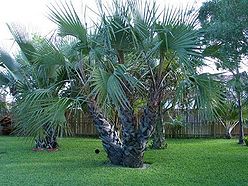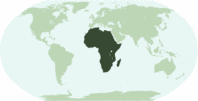Difference between revisions of "Hyphaene dichotoma"
| Line 30: | Line 30: | ||
==Comments and Curiosities== | ==Comments and Curiosities== | ||
| + | Hyphaene dichotoma - The most diverse collection of Hyphaene palms in the world is found at Fairchild, with species from Africa, the Arabian Peninsula, and India. Perhaps the most legendary in the collection is the Doum palm of northeast Africa, also called the gingerbread palm because its red-orange fruit tastes like gingerbread. The Doum palm was held sacred by the ancient Egyptians and drawings of it were found in many Pharaohs' tombs along with the hard stones of its fruit. Today, people along the Nile River make buttons and small decorations from the white center of the doum palm's seed and use the palm's fiber and leaflets to weave baskets and mats. | ||
<br style="clear:both;"/> | <br style="clear:both;"/> | ||
| Line 36: | Line 37: | ||
image:Hyphaene_dichotoma76.jpg|Satellite Beach, FL. Photo by Charlene and Greg, edric. | image:Hyphaene_dichotoma76.jpg|Satellite Beach, FL. Photo by Charlene and Greg, edric. | ||
File:Hyphaene_dichotoma.jpg|Fairchild Tropical Botanic Garden, Miami, FL. Photo by Dr. Scott Zona. | File:Hyphaene_dichotoma.jpg|Fairchild Tropical Botanic Garden, Miami, FL. Photo by Dr. Scott Zona. | ||
| + | [[File:105 FTBG - Doum Palm-XL.jpg|Fairchild Tropical Botanic Garden, Miami, FL. | ||
| + | |||
| + | |||
</gallery></center> | </gallery></center> | ||
==External Links== | ==External Links== | ||
Revision as of 00:37, 23 July 2015
| Hyphaene (high-FEHN-eh) dichotoma (dih-koh-TOH-mah) | |||||||
|---|---|---|---|---|---|---|---|
 Satellite Beach, FL. Photo by Charlene and Greg, edric. | |||||||
| Scientific Classification | |||||||
| |||||||
| Synonyms | |||||||
|
| |||||||
| Native Continent | |||||||
|
| |||||||
| Morphology | |||||||
| |||||||
| Culture | |||||||
|
| |||||||
| Survivability index | |||||||
|
| |||||||
| Common names | |||||||
|
| |||||||
Contents
Habitat and Distribution
India, Sri Lanka. INDIA: Island of Diu, and Ahmedabad in Gujerat.
Description
Beccari (1908) gave details of this species under H. indica describing the fruit as obovate-pyriform and giving an illustration of its longitudinal section; it could not therefore be allied to H. thebaica though it was long regarded to be that species introduced in Cutch in Gujarat. If the species is not really an indigenous but an introduced palm in India, Beccari suggested searching for .its original parent in Arabia especially in Oman where, according 10 reports noticed by Martius, similar palms were seen growing by .ancient travellers. Later Beccari (1924) showed that the Indian species is allied to H. macrocarpa (Becc.) Furtado (=H. multiformis .subsp. H. macrocarpa Becc.) from infra-equatorial east Africa. The protologue of H. dichotoma given under Borassus dichotomus is as follows: "Oka-mundel, covers the whole of Diu Island and is also found in various parts of Goozerat. Mr. Vaupel.
A solitary tree grows on a Hill at Mazagon [Bombay], and it is branched like the Doum Palm. The fructifications have not been examined. See a sketch of the tree, Madras Joumal of Science. N." Now, Hooker (1893) and others regarded this species to have been based on an abnormal branching of Borassus flabellifer; he therefore reduced the former to a synonym of the latter. How., ever, the phrase "it is branched like the Doum Palm" should be taken to mean that the palm produces (perhaps repeatedly) dichotomous branches as in the Doum and one should not expect abnormal branching (if such were really the case) to occur uniformly in all the palms from the Diu Island and from the various parts of Gujarat. Martius (1850) who accepted the species as new remarked that the palm in Bombay was brought by Parsis from Gujarat and could easily be distinguished from B. flabellifer. Besides, monstrous branching in the latter species, he stressed, was irregular and is rare even on the Coromandel of India, where the species is common. Martius added a new locality, Admedabad (also in Gujarat) where Baron von Hugel (Car. =a misprint for Bar.) had collected the specimens. Gammie (fide Beccari) suggested that this species occurred as far south as Goa and Blatter 1926 published a plate of a palm growing at Bassein north of Bombay. (Furtado C.X. 1970)/Palmweb. Editing by edric.
Culture
Comments and Curiosities
Hyphaene dichotoma - The most diverse collection of Hyphaene palms in the world is found at Fairchild, with species from Africa, the Arabian Peninsula, and India. Perhaps the most legendary in the collection is the Doum palm of northeast Africa, also called the gingerbread palm because its red-orange fruit tastes like gingerbread. The Doum palm was held sacred by the ancient Egyptians and drawings of it were found in many Pharaohs' tombs along with the hard stones of its fruit. Today, people along the Nile River make buttons and small decorations from the white center of the doum palm's seed and use the palm's fiber and leaflets to weave baskets and mats.
- IMAGE GALLERY
External Links
References
Phonetic spelling of Latin names by edric.
Special thanks to Geoff Stein, (Palmbob) for his hundreds of photos.
Special thanks to Palmweb.org, Dr. John Dransfield, Dr. Bill Baker & team, for their volumes of information and photos.
Glossary of Palm Terms; Based on the glossary in Dransfield, J., N.W. Uhl, C.B. Asmussen-Lange, W.J. Baker, M.M. Harley & C.E. Lewis. 2008. Genera Palmarum - Evolution and Classification of the Palms. Royal Botanic Gardens, Kew. All images copyright of the artists and photographers (see images for credits).
Furtado C.X. 1970. Asian Species of Hyphaene.
Many Special Thanks to Ed Vaile for his long hours of tireless editing and numerous contributions.



